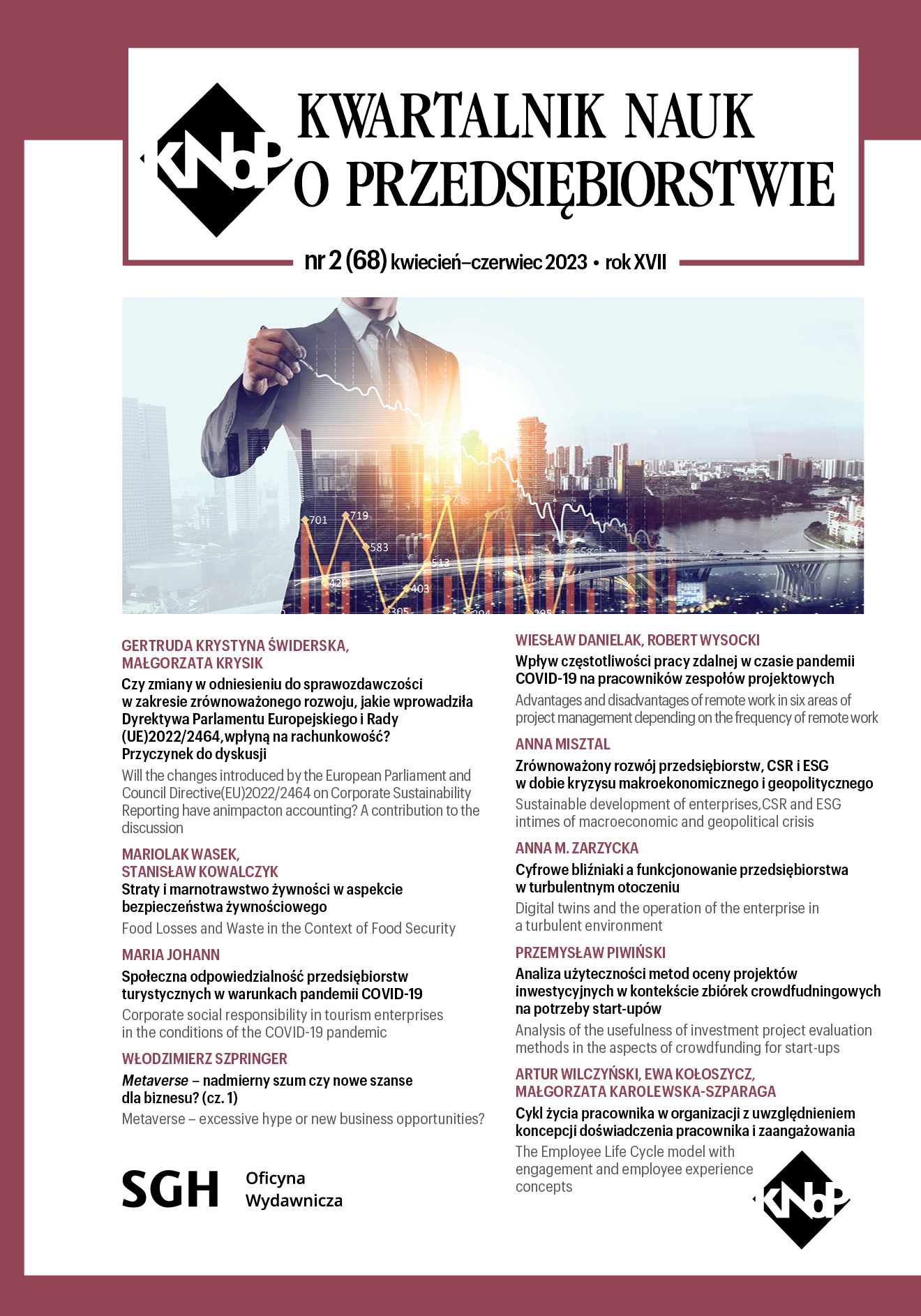Will the changes introduced by the European Parliament and Council Directive (EU) 2022/2464 on Corporate Sustainability Reporting have an impact on accounting? A contribution to the discussion
Main Article Content
Abstract
The adoption of the European Parliament and Council Directive (EU) 2022/2464 on sustainable development reporting represents the second step of a revolution that occurred 20 years ago in the field of financial reporting when the International Financial Reporting Standards (IFRS) harmonized market practices worldwide. Corporate Sustainability Reporting is to be carried out in accordance with uniform sustainable development standards, which will contribute to the disclosure of significant, comparable, and reliable non-financial data. The introduction of uniform reporting standards (European Sustainability Reporting Standard, ESRS) and key performance indicators means that there is a need to collect a lot of data that was not previously collected and process it in a way that allows for the proper disclosure of required information and external verification of reports. The obligation to prepare a sustainable development report will have a significant impact on the scope of work and the accounting tools used by both management and financial accounting. The aim of the article is to initiate a discussion on the changes that should be introduced into accounting, perceiving it as an information system that measures and presents financial and non-financial information while simultaneously considering the ecological, economic, and social determinants of business activity. The analysis of the scope of the required information resulting from the implementation of Directive 2022/2464 indicates the need to introduce changes both in the data collected and processed in financial accounting and in the expansion or supplementation of tools used in management accounting. Among them, the following deserves attention: building a resource -based cost accounting system that takes into account environmental and social factors, incorporating sustainable development issues into the four existing BSC perspectives (financial, customer, internal processes, learning and growth), detailing the budgeting process towards the identification of environmentally sustainable activities within the specified budgets, strong linking of responsibility accounting with environmental and social goals, and budgeting.
Downloads
Article Details

This work is licensed under a Creative Commons Attribution 4.0 International License.
The author of the article declares that the submitted article does not infringe the copyrights of third parties. The author agrees to subject the article to the review procedure and to make editorial changes. The author transfers, free of charge, to SGH Publishing House the author's economic rights to the work in the fields of exploitation listed in the Article 50 of the Act of 4 February 1994 on Copyright and Related Rights – provided that the work has been accepted for publication and published.
SGH Publishing House holds economic copyrights to all content of the journal. Placing the text of the article in a repository, on the author's home page or on any other page is allowed as long as it does not involve obtaining economic benefits, and the text will be provided with source information (including the title, year, number and internet address of the journal).
References
Biernacki P. (2022), CSRD i CSRS. Raportowanie zagadnień zrównoważonego rozwoju, XXIII Doroczna Konferencja Auditingu, Warszawa, 8 listopada 2022.
Dyrektywa Parlamentu Europejskiego i Rady 2022/2464 z 14 grudnia 2022 r. w sprawie zmiany Rozporządzenia (EU) nr 537/2014, Dyrektywy 2004/109/EC, Dyrektywy 2006/43/EC oraz Dyrektywy 2013/34/UE w odniesieniu do sprawozdawczości przedsiębiorstw w zakresie zrównoważonego rozwoju, Dziennik Urzędowy Unii Europejskiej (16.12.2022).
Dyrektywa Parlamentu Europejskiego i Rady 2013/34 z 26 czerwca 2013 r. w sprawie rocznych sprawozdań finansowych, skonsolidowanych sprawozdań finansowych i powiązanych sprawozdań niektórych rodzajów jednostek, zmieniająca dyrektywę Parlamentu Europejskiego i Rady 2006/43/WE oraz uchylająca dyrektywy Rady 78/660/EWG i 83/349/EWG, Dziennik Urzędowy Unii Europejskiej.
EFRAG (2022), ESRS 1 General requirements, Draft European Sustainability Reporting Standards, November 2022.
Kaplan R. S., McMillan D., Reimagining the Balanced Scorecard for the ESG Era, Harvard Business Review Digital Articles (February 3, 2021).
Kronenberg J., Bergler T. (red.) (2010), Wyzwania zrównoważonego rozwoju w Polsce, Fundacja Sendzimira, Kraków, s. 19.
Rozporządzenie delegowane Komisji (UE) 2021/2178 z 6 lipca 2021 r. uzupełniające rozporządzenie Parlamentu Europejskiego i Rady (UE) 2020/852 przez sprecyzowanie treści i prezentacji informacji dotyczących zrównoważonej środowiskowo działalności gospodarczej, które mają być ujawniane przez przedsiębiorstwa podlegające art. 19a lub 29a dyrektywy 2013/34/UE, oraz określenie metody spełnienia tego obowiązku ujawniania informacji, Dz. U. UE.L.2021.443.9.
Rozporządzenie Parlamentu Europejskiego i Rady (UE) 2020/852 z dnia 18 czerwca 2020 r. w sprawie ustanowienia ram ułatwiających zrównoważone inwestycje, zmieniające rozporządzenie (UE) 2019/2088, Dziennik Urzędowy Unii Europejskiej.
Rozporządzenie delegowane Komisji (UE) 2021/2139 z dnia 4 czerwca 2021 r. uzupełniające rozporządzenie Parlamentu Europejskiego i Rady (UE) 2020/852 poprzez ustanowienie technicznych kryteriów kwalifikacji służących określeniu warunków, na jakich dana działalność gospodarcza kwalifikuje się jako wnosząca istotny wkład w łagodzenie zmian klimatu lub w adaptację do zmian klimatu, a także określeniu, czy ta działalność gospodarcza nie wyrządza poważnych szkód względem żadnego z pozostałych celów środowiskowych, Dziennik Urzędowy Unii Europejskiej.
Świderska G. K., Krysik M. (2022), Koszty z perspektywy zrównoważonego rozwoju – przyczynek do dyskusji, Kwartalnik Nauk o Przedsiębiorstwie, 64 (2), 5–16.
Świderska G. K. (red.) (2017), Controlling kosztów im rachunkowość zarządcza, Mac Consulting/ Difin, Warszawa.
Szadziewska A., Michalak I., Remlein M., Szychta A. (2021), Rachunkowość zarządcza a zrównoważony rozwój, Katowice.
Szczypa P. (2016), Budżetowanie w działalności proekologicznej przedsiębiorstwa, Acta Sci. Pol. Silv. Colendar. Ratio Ind. Lignar., 15 (1), s. 37–41.
Tilt C. A. (2009), Corporate Resposibility, Accountig and Accountants, w: S. O. Idowu, W. L. Filho (EDS), Professionals’Perspectives of Corporate Social Responsibility, Springer-Verlag Berlin Heidelberg, s. 28

